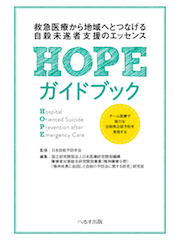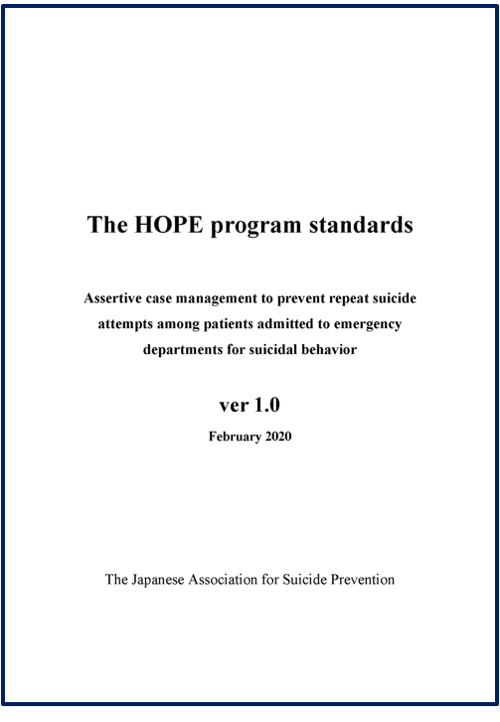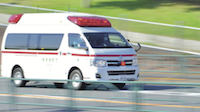Suicide prevention in patients with psychiatric disorders
The HOPE guidebook (in Japanese)
A prior suicide attempt is the single most important risk factor for suicide. Recently, emergency department (ED) visits for attempted suicide are increasingly recognized as opportunities for intervention to prevent later suicides. The number of ambulance transfers to EDs for self-harm behaviors has increased, and most of these suicidal patients have mental health problems (Kawashima et al., 2014). Recently, we have demonstrated that the active contact and follow-up intervention is recommended for suicidal patients admitted to an ED to prevent repeat suicide attempts (Inagaki et al., 2015) (Inagaki et al., 2019). On the other hand, a large scale, multicenter randomized controlled trial, the ACTION-J study, demonstrated that assertive case management was effective at reducing the incidence of recurrent suicidal behavior in the 6 months following discharge among patients admitted to ED after a suicide attempt (Kawanishi et al, 2014). In response to these clinical findings, the assertive case management was adopted by the Japanese Ministry of Health, Labour and Welfare’s medical payment scheme when medical fees covered by the National Health Insurance System were revised in 2016. Here, we publish the HOPE guidebook (in Japanese) for dissemination and implementation purposes.
*We named the assertive case management model the Hospital Oriented suicide Prevention after Emergency care (HOPE) program, because this program is patient-centered but is also based on a hospital-oriented care/service delivery model.
The HOPE program standards (in English) 
As lack of fidelity to the standards contributes to poor results, we have developed an official educational program to train medical professionals in assertive case management. This training course is evidence-based and originated from the training developed for the ACTION-J study (Kawanishi et al, 2014).The training courses are currently run by the Japanese Association for Suicide Prevention. To claim medical costs under the National Health Insurance System, participating psychiatrists and case managers must be officially trained and have certification for the training course. These activities by the Japanese Association for Suicide Prevention are good examples of the dissemination and implementation of the findings of suicide prevention research to real world clinical practice. Here, we publish the HOPE program standards in English, which guide the HOPE program start-up, practical implementation, and program monitoring by clearly defining the minimum requirements. Successful HOPE model implementation and demonstrated improvements in patient outcomes are best accomplished by close adherence to the HOPE program standards.
Important suicide prevention researches from our group
Inui-Yukawa M, Miyaoka H, Yamamoto K, Kamijo Y, Takai M, Yonemoto N, Kawanishi C, Otsuka K, Tachikawa H, Hirayasu Y. Effectiveness of assertive case management for patients with suicidal intent. Psychiatry Res. 304:114125, 2021. Epub 2021 Jul 19.![]()
Okamura K, Komori T, Sugimoto M, Kawashima Y, Yamada M, Kishimoto T. Implementation of evidence-based intervention for suicidal patients admitted to the emergency department: Implications from our real-world experience of assertive case management. Psychiatry Clin Neurosci. 75(3):108-109, 2021. ![]()
Norimoto K, Ikeshita K, Kishimoto T, Okuchi K, Yonemoto N, Sugimoto T, Chida F, Shimoda S, Hirayasu Y, Kawanishi C. Effect of assertive case management intervention on suicide attempters with comorbid Axis I and II psychiatric diagnoses: secondary analysis of a randomised controlled trial. BMC Psychiatry 20:311, 2020.
Kawashima Y, Yonemoto N, Kawanishi C, Otsuka K, Mimura M, Otaka Y, Okamura K, Kinoshita T, Shirakawa O, Yoshimura R, Eto N, Hashimoto S, Tachikawa H, Furuno T, Sugimoto T, Ikeshita K, Inagaki M, Yamada M. A two-day assertive case management educational program for medical personnel to prevent suicide attempts: a multicenter pre-post observational study: Effects of case management training. Psychiatry and Clinical Neurosciences 74(6):362-370, 2020.
Tsujii N, Shirakawa O, Niwa A, Yonemoto N, Kawanishi C, Yamamoto K, Sugimoto T, Hirayasu Y. Hopelessness is associated with repeated suicidal behaviors after discharge in patients admitted to emergency departments for attempted suicide. J Affect Disord. 272:170-175, 2020.
Inagaki M, Kawashima Y, Yonemoto N, Yamada M. Active contact and follow-up interventions to prevent repeat suicide attempts during high-risk periods among patients admitted to emergency departments for suicidal behavior: a systematic review and meta-analysis. BMC Psychiatry 19(1):44, 2019.
Kawashima Y, Yonemoto N, Inagaki M, Inoue K, Kawanishi C, Yamada M. Interventions to prevent suicidal behavior and ideation for patients with cancer: A systematic review. Gen Hosp Psychiatry 60:98-110, 2019.
Yonemoto N, Kawashima Y, Endo K, Yamada M. Implementation of gatekeeper training programs for suicide prevention in Japan: a syustematic review. Int J Ment Health Syst 13(1), 2019.
Kawanishi C, Ishii T, Yonemoto N, Yamada M, Tachikawa H, Kishimoto T, Tsujii N, Hashimoto S, Kinoshita T, Mimura M, Okubo Y, Otsuka K, Yoshimura R. Protocol for a prospective multicentre registry cohort study on suicide attempters given the assertive case management intervention after admission to an emergency department in Japan: post-ACTION-J Study (PACS). BMJ Open 8(9):e020517, 2018.
Furuno T, Nakagawa M, Hino K, Yamada T, Kawashima Y, Matsuoka Y, Shirakawa O, Ishizuka N, Yonemoto N, Kawanishi C, Hirayasu Y. Effectiveness of assertive case management on repeat self-harm in patients admitted for suicide attempt: Findings from ACTION-J study. J Affect Disord. 225:460-465, 2018.
Kodaka M, Hikitsuchi E, Takai M, Okada S, Yasue Watanabe Y, Fukushima K, Yamada M, Inagaki M, Takeshima T, Matsumoto T. Current Implementation of and Opinions and Concerns Regarding Suicide Education for Social Work Undergraduate Students in Japan: A Cross-Sectional Study. Journal of Social Work Education 54:79-93, 2018.
Inagaki M, Kawashima Y, Kawanishi C, Yonemoto N, Sugimoto T, Furuno T, Ikeshita K, Eto N, Tachikawa H, Shiraishi Y, Yamada M. Interventions to prevent repeat suicidal behavior in patients admitted to an emergency department for a suicide attempt: A meta-analysis. J Affect Disord 175:66-78, 2015.
Kawanishi C, Aruga T, Ishizuka N , Yonemoto N, Otsuka K, Kamijo Y, Okubo Y, Ikeshita K, Sakai A, Miyaoka H, Hitomi Y, Iwakuma A, Kinoshita T, Akiyoshi J, Horikawa N, Hirotsune H, Eto N, Iwata N, Kohno M, Iwanami A, Mimura M, Asada T, Hirayasu Y, for the ACTION-J Group. Assertive case management versus enhanced usual care for people with mental health problems who had attempted suicide and were admitted to hospital emergency departments in Japan (ACTION-J): a multicentre, randomised controlled trial. Lancet Psychiatry 1(3):193-201, 2014.
Kawashima Y, Yonemoto N, Inagaki M, Yamada M. Prevalence of suicide attempters in emergency departments in Japan: A systematic review and meta-analysis. Journal of Affective Disorders 163:33-39, 2014.
Kodaka M, Inagaki M, Yamada M. Factors associated with attitudes toward suicide: among Japanese pharmacists participating in the Board Certified Psychiatric Pharmacy Specialist Seminar. Crisis 34(6):420-427, 2013.
Kodaka M, Inagaki M, Postuvan V, Yamada M. Exploration of factors associated with social worker attitudes toward suicide. Int J Soc Psychiatry 59(5):452-459, 2013.
Kodaka M, Postuvan V, Inagaki M, Yamada M. A systematic review of scales that measure attitudes toward suicide. Int J Soc Psychiatry 57:338-361, 2011.



